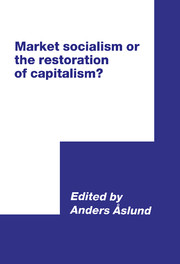Book contents
- Frontmatter
- Contents
- Notes on contributors
- Introduction
- Part I Market socialism revisited
- Part II Economic thinking and policy-making
- 4 The possible new role of market and planning in Poland and Hungary
- 5 Rationalizing the centrally managed economy: the market
- 6 Changes in Soviet economic policy-making in 1989 and 1990
- 7 The restructuring of Soviet industrial ministries since 1985
- Part III Effects of perestroika on Soviet life
- Index
- SELECTED PAPERS FROM THE FOURTH WORLD CONGRESS FOR SOVIET AND EAST EUROPEAN STUDIES, HARROGATE, JULY 1990
4 - The possible new role of market and planning in Poland and Hungary
from Part II - Economic thinking and policy-making
Published online by Cambridge University Press: 04 August 2010
- Frontmatter
- Contents
- Notes on contributors
- Introduction
- Part I Market socialism revisited
- Part II Economic thinking and policy-making
- 4 The possible new role of market and planning in Poland and Hungary
- 5 Rationalizing the centrally managed economy: the market
- 6 Changes in Soviet economic policy-making in 1989 and 1990
- 7 The restructuring of Soviet industrial ministries since 1985
- Part III Effects of perestroika on Soviet life
- Index
- SELECTED PAPERS FROM THE FOURTH WORLD CONGRESS FOR SOVIET AND EAST EUROPEAN STUDIES, HARROGATE, JULY 1990
Summary
Introduction
Poland and Hungary have committed themselves to a full marketization of the economy. The implementation of the commitment is in different stages in the two countries. Poland is trying to achieve this goal in a short period of time, whereas Hungary is following a policy of gradual change.
At the beginning of the 1980s in Poland and Hungary the market played only a subordinate role. Most reformers still believed that planning had to have a very important function in the economy; many believed that planning and market should complement each other in their functions as coordinating mechanisms. By the end of the 1980s, the situation had changed remarkably. Most reformers came to the conclusion that a market economy is the only way out of the economic crisis.
In this chapter I would like first to examine how the views on planning and market developed in the 1980s in Poland and Hungary, then to discuss the official proposals about the new role of planning and, finally, to express my own views about the possible functions of planning in a marketized economy.
Polish and Hungarian views at the beginning of the 1980s
The views of the Polish and Hungarian economists on the economic mechanism went through great changes in the 1980s. At the beginning of the 1980s (in Poland before the declaration of martial law) the vast majority of economists still believed in the reformability of the existing economic mechanism.
- Type
- Chapter
- Information
- Market Socialism or the Restoration of Capitalism? , pp. 47 - 66Publisher: Cambridge University PressPrint publication year: 1991

